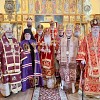Among many national customs, the Serbs have a special one in which we REMEMBER and TIE as well as give gifts on Children’s, Mother’s, and Father’s Day.
The Church Books dedicate the two Sundays preceding Christmas to the Forefathers and Fathers, the Righteous Ones and the Prophets of the Old Testament, who awaited the coming of the Saviour, symbolically depicted Him and prophesied His Advent, but did not live to see Him.
Why did the Church choose to institute this commemoration of the Old Testament Fathers just before Christmas, the day we celebrate the Birth of the Creator of the New Testament? The Church felt it obligatory to portray to its adherents the connection between the old and the new, to teach us to see the history of mankind as a whole, and to show us that God’s plan is a continuous one.
The Serbian people willingly adopted this tradition from the Apostolic Church, and through the years have faithfully kept its teaching. However, being of a very practical intellect, the Serbian people have applied this ancient custom to enhance their lives in the way most beneficial to them.
They divided this commemoration of the Fathers so that one Sunday was dedicated to Children, one to Mothers and one to Fathers. Why? Because Serbs put a strong emphasis on the importance of unity and sharing in family life.
Enlightened by Orthodox Christianity, and realizing that family observances are a priceless tool in preserving family unity, the Serbs guard and nurture their family observances with unparalleled zeal.
Knowing that the Birth of Christ is a fulfillment of the past, a reality of the present and promise of the future, the Serbs, in their preparation for the solemn celebration of the Christmas Holiday want the entire family to participate in demonstratively incorporating itself for the most important and climactic day – the Christmas Feast.
Just as the blood relationship between parents and children is indissoluble, the religious tie between true Christians and Christmas is inseparable. This is the reason why our calendar proposes three holidays before Christmas: Children’s, Mother’s, and Father’s Day. In doing so, we remember the holy children, the holy mothers, and the holy fathers: we link children with parents and parents with children. All three of these observances have one and the same purpose: REMEMBERANCE and TYING.
In celebrating CHILDREN’S DAY we remember all the holy children of God, those innocent creatures of God who Christ Cites as the prime example to those of us who want to enter the kingdom of heaven. For He said: “Verily I say unto you, except ye be converted, and become as little children, ye shall not enter into the Kingdom of Heaven” (Matthew 18, 3).
Then he continued: “Suffer little children, and forbid them not, to come to me: for such is the Kingdom of Heaven “ (Matthew 19, 4). And He concluded: “Whoseever offend one of these little ones which believe in me, it were better for him that a milestone were hanged about his neck, and that he were drowned in the depths of the sea” (Matthew 18,6).
When we cease to be children physically, we lose the receptiveness, naturalness, and candor characteristic of children, which, if properly nurtured, may inspire divine feelings of happiness, esctasy, and charity. Through proper education the children learn to respect their parents, and concomitantly, earn the reputation of being good children and good Christians.
In our celebration of MOTHER’S DAY we dearly remember all the holy mothers from the past history of the Christian Church plus those from our own Serbian Orthodox Church. If there were no holy mothers, many of the Saints would not have been pious, virtuous people, nor would they be commemorated in our calendar today. “Mother” is a holy Name. She suffers much for children both spiritually and physically. Like Christ, her love is inexhaustible. Why did Christ give Himself to be crucified for the sinners? Because He saw in every sinner some good under the shadow of evil. In like manner, only the mother can see something good in her most corrupt son or immoral daughter. And it is very hard to understand Christ’s Love for mankind if we do not properly understand the love of a mother for her children.
In celebrating FATHER’S DAY we remember with esteem all the holy fathers from both the old and new Church. We also remember all the Serbian fathers who gave their lives for “the Holy Cross and golden freedom.”
Psychology and Religion agree that a child receives its first idea about God from its parents. And the role of the father is vital in developing that idea. Traditionally, one of the first things we teach our children is to cross themselves and pray, “In the name of the Father, and of the Son and of the Holy Spirit.”
Consequently, the word “Father” is tied to God from the very beginning. Also, the first prayer we teach our children is the Lord’s Prayer which begins with “Our Father…” Again, here is a tremendous responsibility imposed upon the father since the word “Father” is tied directly to God. With this concept we are telling our children that God is like our Father. And this puts a heavy load on the father for he must be an example of everything good, moral, and charitable. Perhaps we should mention here also that children can get a totally opposite conception of God if their earthly father is a drunkard, or without love, understanding or forgiveness – or if he doesn’t care for his children. But in such cases, the mother comes to the rescue. By showing her devotion and inexhaustible love for her offspring, she overshadows the father’s weakness and molds a beautiful picture of God on their children.
In addition to REMEMBERING, TYING is a representative factor in celebrating these holy days. On Children’s Day parents tie their children, on Mother’s Day children tie their mothers, and on Father’s Day children tie their fathers. The loosing is done with an exchange of gifts. And giving gifts represent devotion and love.
The custom of tying symbolically connects the past with the present: we link them with mutual respect. The two generations are tied with mutual symbolize the love for God. So we see the Serbian people following the Lord’s words, “The wise father brings out of his household the old and the new.” This entire action of tying children with their parents vividly expresses a mutual bond of love between the generations.
A clear picture is exposed of one people, how should they go through their history and living a life of wholeness, combining the priceless treasures of the past with the new adornments of the present and the future.
This moral practice is greatly needed today when there is less and less attention given to the family and unity. Atheistic and other dark powers of this world are increasingly cutting the trunk of the family tree from its roots and creating animosity and divisiveness between the generations. Therefore, we should preserve and perpetuate this important Serbian tradition, one of our many beautiful customs, in celebrating Children’s, Mother’s, and Father’s day. it is imperative because the family observances complement the church and its effort to preserve family unity. Proper observance of these three holidays prior to Christmas, augmented with our diligent preparation for the Holy Day, will inspire a more meaningful and solemn Feast of the Nativity of our Lord and Saviour Jesus Christ.
Source: “Divine Liturgy, Prayers, Catechism”, 1979
|
| ||||||||||||




